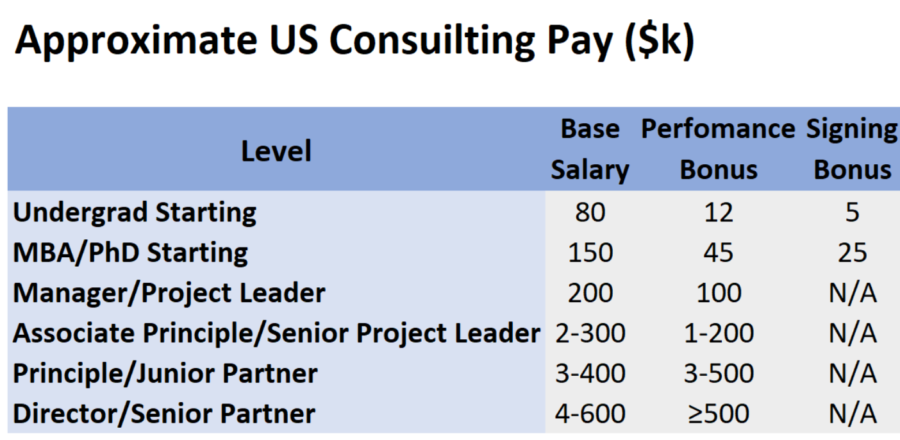Just How Generous are Management Consulting Salaries?

How much does a management consultant actually earn?
It might sound evasive to say “it depends”, but this is actually very much the case in the management consulting world, possible salaries show particularly wide variation even within the same firm.
In this article, we’ll first take a look at a few ballpark mean figures for consultants’ salaries the US, before looking into what accounts for the very large differences in what individual consult
Note that we will not really touch upon differences in local taxation and living costs which can make an additional large difference in the effective “real terms” pay enjoyed by management consultants in different regions.
Average US Earnings for Different Levels of Promotion
Now, it will come as no surprise that an analyst in their first year will not earn the same as a partner. So the main factor determining pay will always be level in the company hierarchy. The table below gives us a good idea of the mean salaries for different levels of seniority within major consulting firms in the US.

Other Factors Determining Exact Salary
Of course, in a global company like McKinsey, there are many other factors determining exactly what any one staff member will receive in their pay packet.
Let’s take a look at the main variables:
Specific Office
You hear the term location, location, location in regards to real estate all the time. Well, the same is true when it comes to the offices of the top consulting firms such as McKinsey. The work environment and culture of different offices within the same firm can be very different, and you need to spend some time researching them.
Even offices in the same country can have significant differences in the salary offered. A McKinsey consultant in New York will command a salary twice as high as the same role in the London office.
Of course, it’s not just about the salary, but also the relative cost of living in a region. Make sure you research individual branches in the regions you are interested in to ensure they suit you.
Don’t forget about the tax situation in specific countries. For example, Dubai has a very beneficial tax regime, but the cost of living can be high. Compare that to London, where the cost of living can be lower, but you will also be paid less and pay more tax.
If the salary is one of the driving factors in your choice of offices, remember to take all the elements into account.

Technical Roles
It is crucial to consider specialisms when it comes to consultancy work. If you have a background in IT, Business Strategy, or Change Management, then you can expect to earn up to 15% more than the generalist business consultant.
This ties in with the particular office you are interested in, as each will specialise within their region. If the dominant industry in the area is oil and gas, you can expect the consultancy office in that region also to focus on that sector. Other offices may work almost exclusively in the financial sector, so it’s essential to determine this before applying to particular offices.
Don’t forget that this may also affect your chances of progression. If your particular specialism is not tied in with the office’s primary business sector, you may be left behind.
A particular office will be far more interested in you if your specialisation aligns with their core work. This is also important for your exit strategy. Many consultants move back to the industry they specialise in after a couple of years. The particular sector your office focussed on, and the work you did will heavily influence how smooth that transition will be.
From the short discussion above, you can see how fundamental it is to align your experience and specialist training to an office that works primarily in that business sector.
Pay Negotiation at Senior Levels

Entry-level consultants and other low-level positions will have little room for salary negotiation. The only influence you are likely to have is by applying to an office that offers a salary close to your expectations. As we mentioned above, this needs to be balanced with the cost of living in that area.
If you research consultancy salaries, you’ll notice that as seniority increases, the spread of approximate income widens. The reason is that senior consultants can influence their salary package through negotiation. What company is going to want to lose their senior staff, and face the cost and uncertainty of hiring new staff for the sake of a salary increase?
In reality, very few, so if you have the skills and experience, remember to use this to your advantage during the annual pay review.
Bonuses
Bonus structures vary between consulting firms and might be based on profit sharing and other arrangements in place in different companies. However, pretty well any consultant will be hoping for an annual bonus which might push towards 20%.
One-time signing and relocation bonuses are also often available, as are some bonuses for having spent prolonged periods of time travelling away from home.
After Consulting: Exit Opportunities
It might sound strange at first, but a top-end management consultant does not stop profiting from being a member of that profession after they leave a consulting firm.
Rather, the expertise they will find that their experience and the trust placed in the brands of the major consultancies continues to grant them career opportunities for the remainder of their working life.
Even the network they will have made in the course of their consulting work will be potentially lucrative.
In this way, having worked somewhere like McKinsey, Bain or BCG will more-or-less ensure that you have excellent career prospects and a solid income indefinitely.
Final Thoughts

Of course, you should not be taking any job simply for the money. Consulting is incredibly demanding and if you don’t love the work for what it is, you won’t stick it out to claim very many paycheques.
That being said, if you do love the work, then the pay is definitely a nice perk!